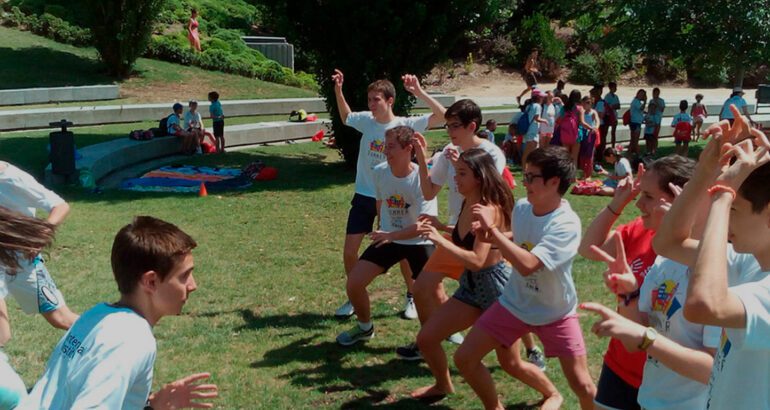
Siete cosas sorprendentes que los niños aprenden en un campamento de verano en inglés
Siete cosas sorprendentes que los niños aprenden en un campamento de verano en inglés
Las vacaciones de verano representan un momento muy bonito para los niños, pero a la vez estresante para los padres: ¿qué hacer con los niños para que no se aburran? ¿quién va a cuidar de ellos mientras trabajamos?
Una de las soluciones más comunes y a la vez más divertida para pasar el verano son los campamentos. En este artículo, te detallaremos 7 cosas sorprendentes que los niños aprenden en los campamentos de verano.
1. Aprendizaje y juego durante los campamentos de verano en inglés
El juego es esencial en la educación, no solo porque sea sinónimo de diversión sino también por ser el medio natural en el que niños y adolescentes experimentan, desarrollan su curiosidad y asumen responsabilidad sobre sus decisiones, todo ello en el entorno seguro y amable que proporciona un campamento de verano.
2. Autonomía de criterio y de acción durante el campamento de verano en inglés
Facilitando la experimentación libre y sin riesgos, los niños y adolescentes desarrollan la autonomía de criterio, dotándolos así de una cualidad que los acompañará a lo largo de toda su etapa educativa y esencial para la vida.
3. Espíritu de equipo durante los campamentos de verano en inglés
Los juegos al aire libre, los proyectos de investigación, los grupos de teatro, todo ello tiene algo en común y es la colaboración. El fomento del trabajo en equipo y la capacidad de colaborar con personas distintas que incluso se conocen poco, es algo que se practica de forma natural en el entorno que un campamento de verano proporciona.
4. Nuevas y duraderas amistades durante el campamento de verano en inglés
Los campamentos de verano en inglés constituyen una forma eficaz de exponer a niños y jóvenes a un nuevo ambiente donde pueden con facilidad hacer nuevas amistades mientras participan en actividades en equipo, ya sean juegos al aire libre, representaciones teatrales, experimentos de ciencias en el jardín o proyectos de investigación en la biblioteca.
5. Una cultura diferente … ¡cerca de casa!
Se pueden aprovechar las vacaciones de verano para ofrecer a niños y adolescentes la oportunidad de conocer otra cultura. La opción de viajar al extranjero es muy habitual, pero hay circunstancias de toda índole que requieren tener a nuestros hijos cerca de casa. Aún así es posible reproducir un ambiente de contacto permanente con otra cultura sin tener que salir de su ciudad. Para ello hay que buscar el campamento que mayores garantías ofrezca en cuanto a su modelo educativo pues la enseñanza del idioma debe incluir un rico contenido de cultura en todos los niveles y todas las edades. Aquí juega un papel esencial las características del profesorado y la experiencia del centro en llevar a cabo este tipo de campamentos.
6. Preparación para viajes de estudios a Estados Unidos.
En la actualidad muchos padres tiene interés en que su hijos por sí mismos se abran a la posibilidad de hacer estancias en Estados Unidos o en otro país . Los campamentos de verano en inglés favorecen ese interés por otra cultura y el conocimiento de otros niños o jóvenes que han tenido esa experiencia. Muchas veces son los profesores que con su presencia estimulan la curiosidad de los niños y jóvenes por conocer otros países y culturas..
7. Nuevas aficiones
El verano tiene que servir para aparcar un poco la rutina del año escolar y constituirse en periodo de apertura a nuevas personas, experimentar nuevas actividades y descubrir nuevos intereses.
El campamento en inglés ofrece posibilidad de sumergirse en temas distintos a los que los niños y jóvenes tratan durante el año escolar o con enfoques distintos.
¿Y los hermanos en pre- escolar?
Algunos campamentos ofrecen la opción a las madres/padres de unirse a grupos que surgen entre los mismos padres para hablar de temas de su interés al tiempo que sus niños socializan con otros niños, muchas veces por primera vez. Allí padres y sus hijos conversan en inglés.
Profesorado
Si se opta por un campamento en inglés es conveniente que el equipo de profesores esté compuesto por profesionales experimentados y con las cualificaciones profesionales adecuadas, es decir no simplemente monitores que hablan más o menos bien inglés. Es importante que los profesores sean profesionales de la enseñanza cuya lengua materna sea el inglés con un amplio conocimiento de la educación infantil, primaria o secundaria – según el caso – y al tanto de las novedades pedagógicas. Igualmente es necesario que mantengan estrecho contacto con la cultura de su país para que sean capaces de ofrecer una versión actualizada de la lengua y cultura de su país.
Instalaciones
El campamento se desarrolla en el barrio de Chamberí de Madrid en un espléndido edificio terminado en 1910 que es bien de interés histórico y que se diseñó con fin educativo. De ahí sus luminosas y bien ventiladas aulas, sus amplias galerías y su jardín oculto desde el exterior.
Tradición
El Instituto Internacional es una institución sin ánimo de lucro norteamericana que lleva 130 años favoreciendo el intercambio educativo entre España y los Estados Unidos. La convicción de que la educación es una fuerza motora que hacen avanzar al individuo y a la sociedad es el hilo conductor de esta institución. Desde su creación en San Sebastián en 1892 impartió clases de inglés a sus alumnas – en aquella época solo mujeres- y no ha dejado de hacerlo desde entonces.



